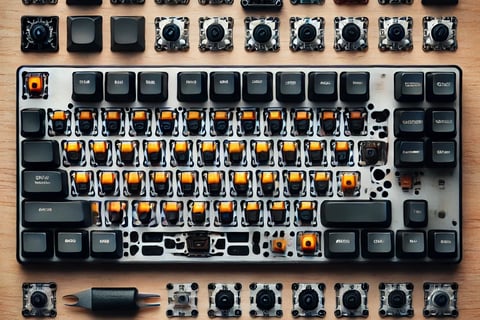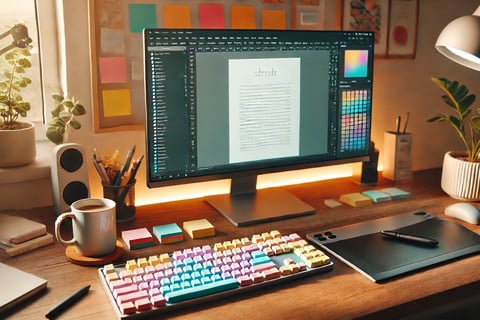Mechanical vs. Membrane Keyboard: Which One Is Better?
Mechanical vs. Membrane Keyboard: Which One Is Better?Understanding Mechanical and Membrane KeyboardsBefore diving into the comparison, let's understand what mechanical and membrane keyboards are and how they work.
3/5/20254 min read


Keyboards are essential peripherals for computers, used in everything from casual typing to professional gaming and programming. However, when choosing a keyboard, one of the biggest debates is whether to go for a mechanical keyboard or a membrane keyboard. Each type has its own advantages and disadvantages, making it crucial to understand their differences before making a decision.
In this article, we will compare mechanical and membrane keyboards based on various factors, including build quality, typing experience, durability, gaming performance, price, and personal preferences, to help you determine which one is better for you.
1. Understanding Mechanical and Membrane Keyboards
Before diving into the comparison, let's understand what mechanical and membrane keyboards are and how they work.
What is a Mechanical Keyboard?
A mechanical keyboard is a type of keyboard that uses individual mechanical switches for each key. These switches consist of multiple components, including a spring, stem, and housing, which provide tactile feedback and distinct key actuation. Some well-known mechanical switch manufacturers include Cherry MX, Razer, Gateron, and Kailh.
What is a Membrane Keyboard?
A membrane keyboard uses a rubber or silicone membrane to register key presses. The keys are not separate components but are instead pressed against the membrane, completing an electrical circuit to send the input to the computer. Membrane keyboards are commonly found in office environments, budget laptops, and entry-level desktop keyboards.
2. Build Quality and Durability
Mechanical Keyboards
Mechanical keyboards are built with high-quality materials and durable switches.
The individual switches have a lifespan of 50 to 100 million keystrokes, making them extremely long-lasting.
They often have a sturdy metal or high-quality plastic casing that enhances durability.
Some mechanical keyboards are spill-resistant and hot-swappable, allowing users to replace switches without soldering.
Membrane Keyboards
Membrane keyboards are generally made of plastic and rubber, making them lighter but also less durable.
The rubber dome switches tend to wear out after 5 to 10 million keystrokes, which is significantly lower than mechanical keyboards.
Over time, keys can become mushy and unresponsive due to the breakdown of the rubber membranes.
Winner: Mechanical keyboards offer superior build quality and durability.


3. Typing Experience and Comfort
Mechanical Keyboards
Offer a satisfying tactile feedback and an audible clicky sound (depending on switch type).
Key presses require less force compared to membrane keyboards, reducing finger fatigue.
Various switch types (Linear, Tactile, Clicky) allow users to choose their preferred typing experience.
More comfortable for long typing sessions due to ergonomic design and custom keycap options.
Membrane Keyboards
Provide a softer and quieter typing experience, making them ideal for office environments.
Keys require more force to register a press, which can cause fatigue over time.
No distinct tactile feedback, making it harder to determine if a key press was registered.
Winner: Mechanical keyboards provide a better and more comfortable typing experience.
4. Gaming Performance
Mechanical Keyboards
Feature faster key response times and higher precision, making them ideal for gaming.
N-key rollover (NKRO) and anti-ghosting allow multiple key presses to be registered simultaneously without issues.
Customizable RGB lighting and programmable macro keys enhance the gaming experience.
More durable switches ensure long-term reliability in gaming marathons.
Membrane Keyboards
Slower response time, which can impact reaction speed in fast-paced games.
Most membrane keyboards lack NKRO and anti-ghosting, causing missed inputs in competitive gaming.
Limited customizability and lack of macro keys.
Winner: Mechanical keyboards dominate in gaming performance.
5. Noise Levels
Mechanical Keyboards
Mechanical keyboards can be noisy, especially with clicky switches like Cherry MX Blue.
Quieter switches like Cherry MX Red and Brown or silent switches can reduce noise but still produce some sound.
Noise level depends on switch type and key dampeners.
Membrane Keyboards
Much quieter compared to mechanical keyboards, making them suitable for shared workspaces and libraries.
The soft rubber dome design dampens keypress sounds naturally.
Winner: Membrane keyboards are the better choice if you need a quiet typing experience.
6. Price and Affordability
Mechanical Keyboards
More expensive, with prices ranging from $50 to $300+, depending on brand, switch type, and features.
Higher initial cost but provides better longevity, making it a worthwhile investment.
Membrane Keyboards
Budget-friendly, typically costing $10 to $50, making them accessible to most users.
Ideal for casual users who do not require advanced features.
Winner: Membrane keyboards are more affordable, but mechanical keyboards offer better value over time.
7. Maintenance and Customization
Mechanical Keyboards
Easy to clean as keycaps can be removed and replaced.
Switches can be lubricated, replaced, or customized for a personalized feel.
RGB lighting, programmable keys, and macro functions allow deep customization.
Membrane Keyboards
Harder to clean as keycaps are usually non-removable.
Limited customization options.
If a key stops working, the entire keyboard may need to be replaced.
Winner: Mechanical keyboards offer better maintenance and customization options.


8. Which One Should You Choose?
Choose a Mechanical Keyboard If:
You want durability and a long-lasting investment.
You prefer a tactile and satisfying typing experience.
You are a gamer or a professional typist who needs fast response times.
You like to customize your keyboard with different switches, keycaps, and lighting.
Choose a Membrane Keyboard If:
You need a budget-friendly and simple keyboard for casual use.
You prefer a quieter typing experience in a shared workspace.
You don’t require high-speed response times or advanced gaming features.
You need a lightweight and portable keyboard.
Final Verdict: Which One is Better?
There is no one-size-fits-all answer to whether a mechanical or membrane keyboard is better—it depends on your needs and preferences.
If you want premium build quality, better durability, superior typing experience, and gaming performance, mechanical keyboards are the clear winner.
If you are on a tight budget, prefer a quieter typing experience, or need a lightweight option for casual use, membrane keyboards might be the better choice.
mr.Udit kumar
info@worldbesthub.com
+91-8920162717
Contact Us
Keyboard Basics & Functions
Keyboard Shortcuts & Productivity
Gaming Keyboards & Features
